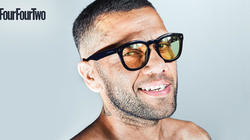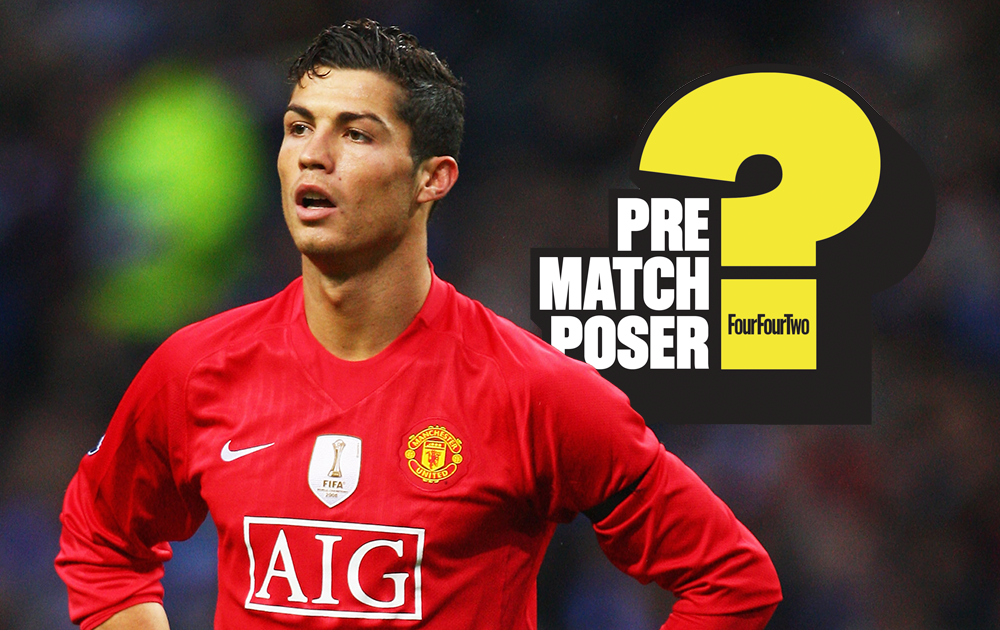The big interview: Steve McClaren - "Not qualifying for Euro 2008 was a crime, but ultimately there was one man responsible – me"
What was it like being No.2 to Sven and Fergie? Does he still have a future in management? And whatever happened to that brolly? Your questions answered in March 2018…
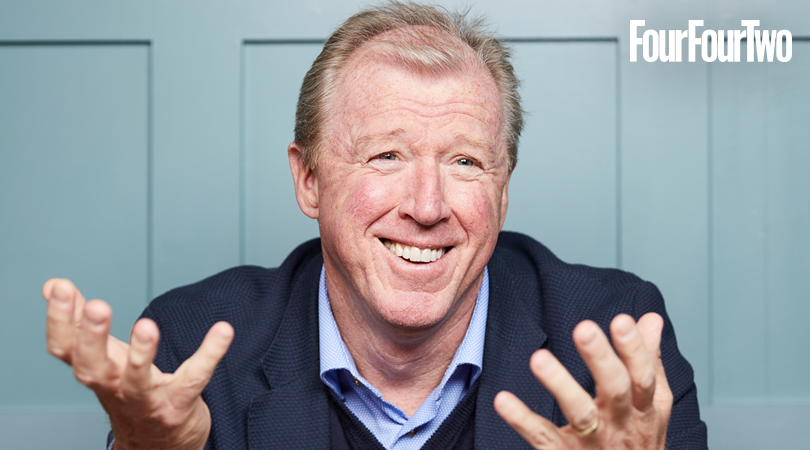
Portrait: Garrod Kirkwood
There’s a big queue snaking along the High Street in Yarm, a few miles west of Middlesbrough. A celebrity’s in town and all the locals are determined not to miss him.
However, the man they're waiting to see isn’t Steve McClaren – it’s Rick Stein, signing some cookery books at the local Waterstones. Instead, McClaren greets FFT a couple of doors down at the smart Italian eatery Cena Trattoria, turning up virtually unnoticed. That suits the former England manager just fine: after a spell as coaching consultant at Israeli outfit Maccabi Tel Aviv, he’s now back at home to enjoy the quiet life with his family for a brief period.
“This was my place of solitude after the England job,” he tells us. McClaren knows that he will never completely escape the ‘Wally with a Brolly’ nickname, but while he politely declines FFT’s cheeky request to pose for some photos with a cocktail umbrella (“I can’t, the media would kill me for it!”), he’s in a relaxed mood and ready to speak candidly about a career that has delivered its fair share of highs and lows over the years...
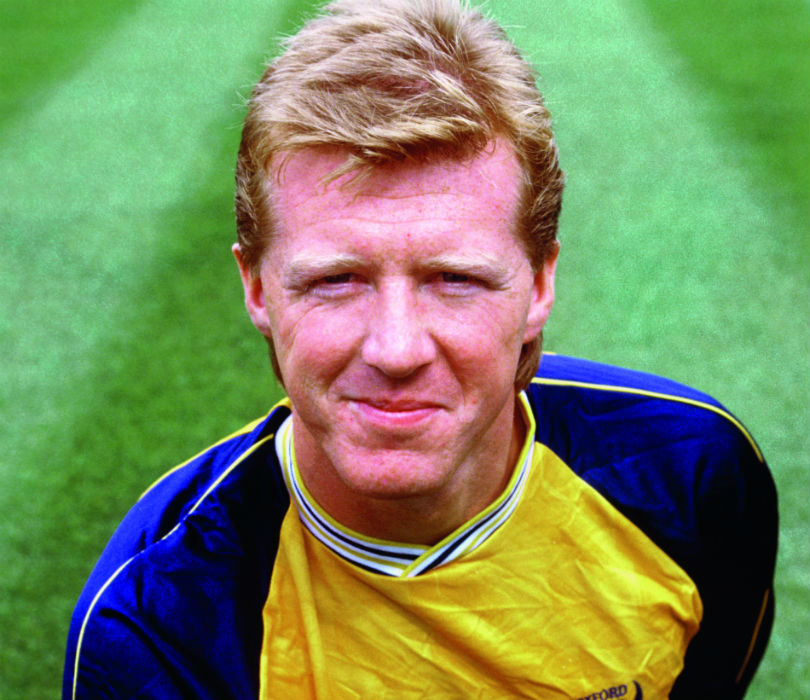
You played for Derby and Oxford, who were both owned by Robert Maxwell at the time. Did you ever get to have a ride on his yacht?
Gerry Brown, via Facebook
I didn’t, no! Robert’s sons were in charge of the two clubs then so I met them without meeting the big chief. But I heard stories from Jim Smith about the Maxwell days and the things that went on – I’d better not repeat them, though...
Did you always know that you wanted to be a coach or manager?
Andy Bryan, York
The best features, fun and footballing quizzes, straight to your inbox every week.
I had potential as a player but suffered a bad injury at Derby and struggled to play at the level I wanted after that. At 31, I already knew that when a chance to become a coach came along, it was something I wanted to do. Oxford was my apprenticeship, working with Brian Horton and Denis Smith. I loved going into the manager’s office after games. Jim Smith was there quite a lot. He’s an Oxford legend who would come to see the games and I’d always get his drink – a whisky. When he got the Derby job, he said that he liked the way I’d always served his drink and took me on as his assistant manager. Jim allowed me to be very innovative at Derby – we were the first to introduce Prozone, brought in a psychologist, used sports science...
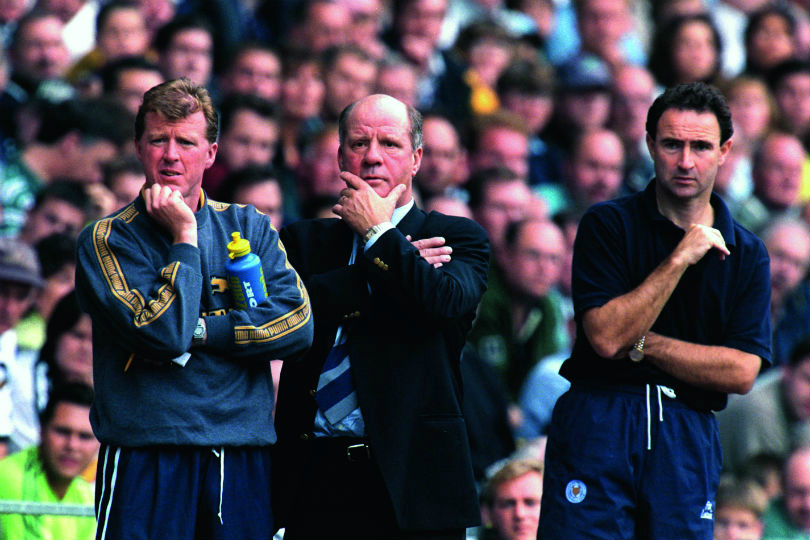
What did you think when Manchester United chairman Martin Edwards first introduced you as ‘Steve McClaridge’?
Iain Cross, Sale
I think that’s when I knew that it was a big job! One Saturday night I’d got a telephone call, “It’s Alex Ferguson here”. I said, “Come on... who is it really?” He said, “It’s Alex Ferguson” and I said, “Oh, evening Alex!” He asked me to join him as his new assistant, but Derby were playing United on the Tuesday night so he would speak to Jim Smith afterwards. I had to keep it quiet. We played pretty well at Old Trafford and only lost 1-0 but I remember thinking to myself during the game, ‘Do I want us to win here, or do I want us to lose?’ Jim was brilliant about it – he never protested about me going to Man United, because he knew it was a really good opportunity for me.
You'd never played at the top level before – did you have to prove yourself to the United players?
Steve Whitlow, Halesowen
Did I have to prove myself? Wow, did I. My first five months at Old Trafford were the toughest five months of my life, still to this day – from January 1999 to the end of May when we won the Treble in Barcelona. Every single night I would be up until about 3am, planning a session for the following day knowing it had to be perfect, as if it wasn’t they’d kill me.
I’d start putting cones out and Teddy Sheringham was the worst. He’d say to me, “Steve, did you have a glass of wine too many last night? Those cones aren’t in a straight line.” For everything it was, “Why are we doing this, Steve?” I had to have all the answers. Eventually, I was accepted because sessions were bright, intense and competitive. I had to make it that way, so the players knew it would be difficult but enjoyable. They were all competitive – it could have been a war zone every day, because there were so many winners within that United squad.
1979-85 Hull
1985-88 Derby
1987 Lincoln (loan)
1988-89 Bristol City
1989-92 Oxford
What did it feel like to win the Treble at the Camp Nou in 1999?
Thomas Aiston, Salford
Incredible. I remember thinking, ‘I just want to retire now!’ We went on a lap of honour after that Champions League final and I stayed at the end where the Bayern Munich fans had been, looking back at three-quarters of the Camp Nou still full of United supporters, soaking it up for five minutes. For somebody who hadn't had a great playing career and who was only five or six years into their coaching career, I thought I’d died and gone to heaven.
The next morning, the gaffer had all the staff in at The Cliff, our old training ground, with bacon butties and tea, planning the following season. That’s why Fergie was so successful for 27 years – 99 per cent of people would want to go off on holiday but he got the staff in, medals away, asking, “How are we going to repeat this?” Unbelievable! The bacon butties were decent as well.
What was the weirdest job Fergie ever made you do as his No.2?
Andreas Meyer, via Facebook
Manage the Manchester derby! He told me at the start of the season: “Steve, my son’s getting married out in South Africa and that day it’s the Manchester derby, so you’re going to have to take it.” Thank goodness we won 1-0 – David Beckham scored a magnificent free-kick early on. So my win record as Manchester United caretaker manager is 100 per cent. All I could think about was Alex watching the game and dying to call me – I think he did during half-time to say, “Tell that Dwight Yorke to start moving!” But he’d trust people to do their job. That was his other secret as a manager.
Two days after I joined United we won 8-1 at Nottingham Forest and I had this fear of ‘What can I actually bring to the team? What can I really coach?’ I went to see Alex on the Monday morning and asked him what he’d like me to work on, but he said: “Steve, what were you doing at Derby? Just do that – that’s why I’ve brought you here.” He told me to get on with the coaching, hardly gave me any feedback and never came over and said, ‘I want you to work on this or that’. He simply gave me a blank sheet of paper.
Two days after I joined United we won 8-1 at Nottingham Forest and I had this fear of ‘What can I actually bring to the team? What can I really coach?’
You were on England’s coaching staff for the 5-1 win over Germany in 2001. What was the game plan?
Freddie Davies, Chelmsford
What Sven-Goran Eriksson provided the England team was pure simplicity. He’s the calmest man I’ve known in football, ever. Whenever we’d discuss decisions, we’d say, “Sven, what do you think?” He would often say, “I think, Stevie, we will sleep on it. We will see in the morning.” I think he knew what his decision was – I don’t think Sven’s ever had a sleepless night in his life, whereas I’ve had many! That was the big difference. He brought calmness and simplicity, we played with a 4-4-2 and he allowed players to play. It was just one of those matches where everything clicked into place and all the potential, which was always there with those players, suddenly came together. It was the most memorable night I had while working with the England squad.
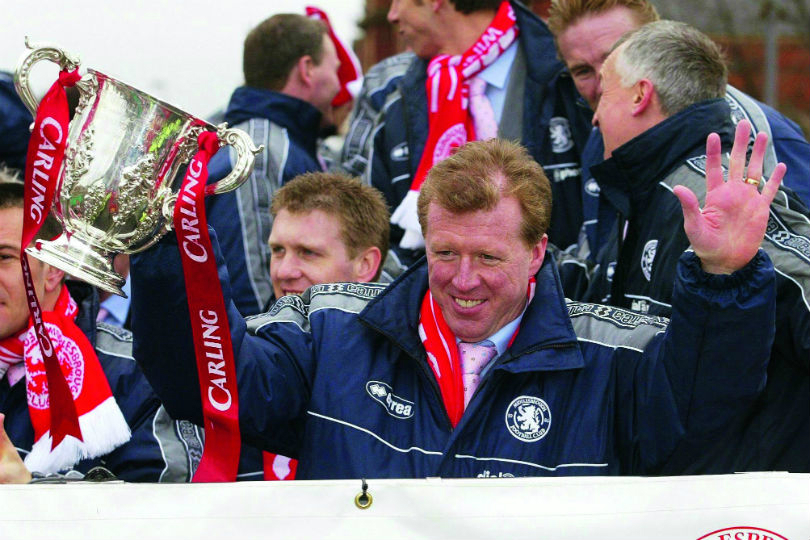
Should England have won something under Sven?
Andrew Rainford, via Twitter
People will always say that, but in major tournaments there are some things you can control and some things you can’t. In 2002 we had an excellent World Cup but just ran out of energy at the end. I remember the long train journey to Tokyo from Kobe, then the long bus drive and the heat. We played Brazil in the quarters – the first half was great but we ran out of gas. I thought the team would mature and get better, and it did by Euro 2004. That was our best time. [FFT: Had Rooney not got injured, would England have won Euro 2004?] Without a doubt. Portugal was the best chance because Wayne was in unbelievable form during that tournament and I just felt, ‘We are going to win this’. Sadly it wasn’t to be.
You led Middlesbrough to a first ever major trophy – the 2004 League Cup – and a European final, too. Would you say they are your greatest managerial achievements?
Jesse Ridgway, via emailYes, I think so. I would never have left Man United and would still wish to be at the club to this day, but the gaffer said to me: “I’m going to retire at the end of the season, so if you get an opportunity somewhere, it might be an idea to go your own way.” But after my first four matches in charge of Middlesbrough [in 2001/02], we had no points and had conceded 11 goals – the newspaper headline read ‘Pointless and Clueless’. But the chairman, Steve Gibson, and all the fantastic staff I had at the club dragged me through it. We ended up getting to the FA Cup semis in that first year, built on it to win our first trophy, the League Cup, and reached the UEFA Cup final in 2006. I was given five years to build something there, and not many people are given that much time.
Since ’96, the only English managers to win a major trophy with an English club have been yourself in 2004 and Harry Redknapp in 2008. Do you feel that’s overlooked?
Barry Fox, Portsmouth
These things are often overlooked until a few years later. My main aim is to be respected in football. During 25 years – 15 as a manager – you’re going to have ups and downs. I’ve got a long CV and I’ve taken risks – I’ve gone abroad and taken on jobs which maybe in hindsight were a mistake, but I’ve always tried to take on challenges. I’m prepared to fail, which I have done massively at times. But if you’re not prepared to fail, you’ll never have the opportunity to succeed.
I can say that I’ve won things. The two people that I wanted to win a trophy for at Middlesbrough were Steve Gibson and Juninho. At the end of that League Cup final [a 2-1 victory against Bolton], I just wanted to get Steve out on the pitch. He didn’t want to at first, but eventually he was persuaded. Then I remember being doused with champagne by the players – funnily enough, wishing that I had an umbrella with me to keep my hair dry...
How did you feel when that Boro fan threw a season ticket at you in 2006?
Anna Wilson, Hartlepool
That was during my last year at the club. We got beat 4-0 at home by Aston Villa and a bloke came onto the pitch, threw his season ticket at me and yelled, “Get lost, McClaren!” I just couldn’t believe it. After the game I expected to be sacked. I walked upstairs and David O’Leary, the Villa boss, was having a beer with Steve Gibson. I was thinking, ‘Oh no, he’s my replacement’. But David left and Steve said, “Don’t worry, your job’s safe”.
Two months later we were pulling off miracles in the UEFA Cup, beating Basel and Steaua Bucharest to reach the final. We were 3-0 down on aggregate in the quarters against Basel so Steve Round, my assistant, said: “Move the wingers to full-backs, and put attackers on as wide players.” I thought: ‘That’s committing suicide – we’ll get thrashed by seven or eight’. But I followed his advice and we won 4-3. Unbelievable. I told the players: “Enjoy the night, as this will only happen once in your career” – then three weeks later against Steaua it happened again!
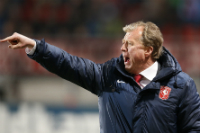
2001-06 Middlesbrough
2006-07 England
2008-10 Twente
2010-11 Wolfsburg
2011 Nottingham Forest
2012-13 Twente
2013-15 Derby
2015-16 Newcastle
2016-17 Derby
What were your emotions after being offered the England job?
Sarah Monroe, Middlesbrough
I'd been involved for four or five years as assistant, so it seemed like a natural progression for me. But right up until the moment I accepted the role, there was still this nagging doubt in my mind. Was I experienced enough to handle the job?
I knew I could handle the football side and the players, but would I be able to handle everything else that came with the England job? It was a huge risk but I don’t regret it. Being the England boss has given me so many opportunities in life that I would never have experienced if I’d stayed as Middlesbrough manager. It was a massive opportunity I felt I had to take, against a lot of people’s advice, but I wasn’t experienced enough to deal with everything outside the football side of things. In the end that was my failure.
You decided to leave David Beckham out of your first England squad – was that the hardest decision you’ve ever had to make as a manager?
James Dillon, Ruislip
Absolutely, as I loved him to death. His display against Greece at Old Trafford in 2001 [to secure England’s qualification for the World Cup] was something I’ve witnessed on only a few occasions. Roy Keane at Juventus in 1999 [Champions League semi-final second leg] would be another. We were sinking fast and Becks just decided to take control of the game.
But he was going to LA Galaxy. It was such a difficult decision to leave him out but I felt I needed to make a bold one, to put my mark on things early. He was very disappointed when I told him, but he’d also just relinquished the captaincy so it was kind of an indication that it was time for change. We always had a very good relationship. He was the ultimate professional – once David crossed that white line, he had to be the best and he would give you everything.
It was tough to leave him out and easy to bring him back. I put him on at half-time at home to Croatia and he changed the game to get us back to 2-2. I thought, ‘I’m 10 or 15 minutes from making one of the best decisions of my life’. Then it crumbled...
You were in a strong qualifying group for Euro 2008 with Croatia and Russia, who both did well at the tournament. In hindsight, was it such a crime that England didn’t qualify?
Jamie Morgan, Plymouth
They were both really strong teams, but no, I think ultimately it still was a crime. We should have qualified. I thought the group was a damn tough group – there were those two and then Israel as well. It’s not very easy to go out there and get a victory, but we should have qualified.
Did that freak opening goal in Croatia kill the confidence of goalkeeper Paul Robinson? He never really seemed to recover from it...
Gary Pritchard, Enfield
I think it killed his confidence and killed a lot of people’s confidence. We started well – we won a friendly against Greece, the European champions, 4-0 and then won 1-0 in Macedonia. Croatia was the first serious test but the defeat knocked a lot of confidence – not just the players but the supporters and the media, too.
The confidence we'd already gained evaporated quickly, which is what often happens in international football in the media. It was a freak goal. You couldn’t blame Paul or Gary Neville, who’d played the backpass to him. We tried something different in that game, 3-5-2. It worked well for a while but results matter, and whatever you try during a loss is usually deemed a failure. After that we got back to simplicity in the run-in, with 3-0 wins over Andorra, Estonia, Israel and Russia. But then we lost players to injury again. I can look at many different reasons for why we didn’t qualify – such as injuries and bad luck – but ultimately there was one man responsible, and that was me.
What would you have done differently in the decisive 3-2 defeat to Croatia?
Mo Nish Choudhury, via Facebook
Two things. The first is start with a 4-4-2 formation instead of 4-5-1. I felt we just needed the draw and that would give us a good platform. It didn’t, so we changed to 4-4-2 at half-time. The second thing would be to make a substitution before they scored their third. I should have done it five minutes earlier, so they are my two regrets.
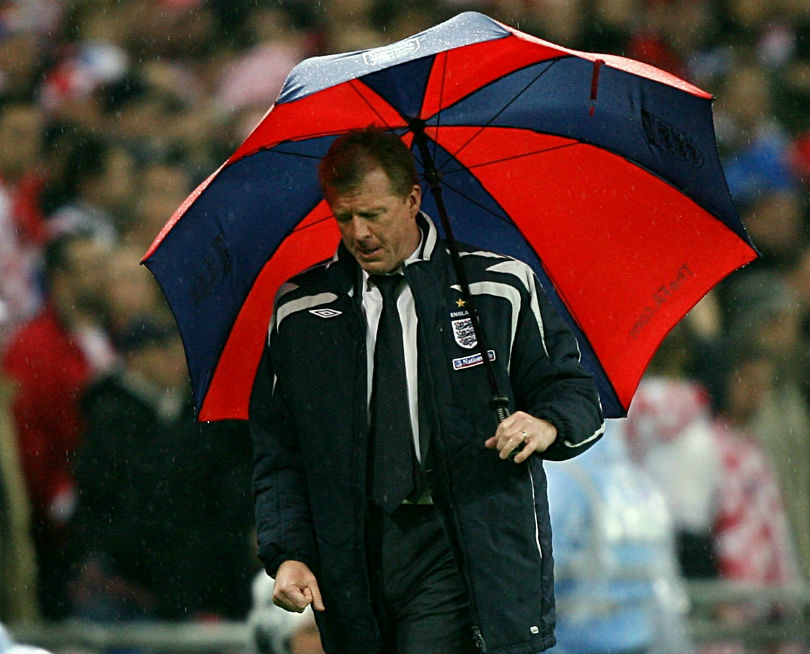
Have you still got that brolly, or was it binned?
Lance Phillips, via Facebook
I always like to see the warm-up, but I walked out and it was chucking it down with rain. I saw Slaven Bilic with a beanie hat on and thought, ‘I’m not going to wear one of those. I’ll get killed for that!’ There was this FA umbrella lying around so I thought, ‘I’ll use that, support the FA and keep myself dry!’ After thinking I’d get killed for wearing a beanie, instead I got killed for holding a brolly.
Later I went to Holland and at Heracles there is no dugout – just benches with no cover. We had around eight members of staff at Twente and each of them used an umbrella. As I came out the team manager asked: “Trainer! Would you like an umbrella?” I said: “No, I’ll end up looking like a drowned rat on the substitutes’ bench, but I will not have an umbrella...” So have I still got the umbrella? No! I’m surprised that umbrella companies haven’t approached me yet to advertise them, to be honest, but then again I’m not sure it’d be good publicity for them...
How did you feel when your tenure as England manager ended?
Janet Frecklington, LeicesterI think it was expected. We had to beat Croatia and we needed to qualify for the Euros. Yarm was my refuge at that time, because I couldn’t go anywhere else in the country and I didn’t want to be seen at any games. It was quite a lonely time. I struggled to get another job in England and decided to go abroad. But all things happen for a reason – it was meant for me to go abroad and join Twente and it was one of the best decisions I’ve made.
The Ajax team you beat to the league title with Twente in 2009/10 featured Christian Eriksen, Toby Alderweireld, Jan Vertonghen and Luis Suarez. Does it frustrate you when people criticise the quality of the Eredivisie?
Arnout Schel, Amsterdam
The Eredivisie was very competitive and that Ajax team was phenomenal – Luis Suarez would occasionally dribble from the halfway line to score goals. PSV were decent, as were the AZ team that Louis van Gaal had lifted the league title with the season before. We had a really good team, one of the best footballing teams I’ve ever managed. I remember seeing this poster showing the last 50 years of Eredivisie winners and their flags, and it was Ajax, PSV or Feyenoord.
There were only two, AZ and Twente, who’d broken that in half a century – that was when it hit me what a fantastic achievement it was. I learned so much about the game there and brought my British mentality. It’s OK keeping possession, but we must win. It was an incredible two years there.
What were you thinking when you did that Dutch accent, Schteve?
Hasan Haq, via Facebook
You know what it’s like if you’re abroad, you fall into it – and I fell into it. When you’re abroad, everybody speaks like that – slow and pronounced – to be understood better. I went to work in Tel Aviv recently and did an interview in my first week. I said to the media manager: “If I start talking slowly, give me a nudge to speak properly.” It was quite comical and I’m glad Joey Barton followed it up with his French accent when he went to Marseille. I met Joey at QPR when I had a brief spell coaching there under Harry Redknapp, and we’d often have a good laugh about the accents. He could speak French and I could speak Dutch!
Did it feel like you had your hands tied at Nottingham Forest?
Andy Barnes, Nottingham
Yes it did. I went to Forest with a certain expectation and felt I needed to achieve, coming back to England. I just felt that once we had got in there, the resources available weren’t enough. That’s one of the biggest regrets of my career, having to quit for the better of the club and the better of myself – to agree that it simply wasn’t working out and move on quickly before even more damage was caused.

Did the speculation linking you to the Newcastle job in 2014/15 affect your chances of sealing promotion at Derby during your first spell there?
Graeme Moss, Chesterfield
Absolutely. My first season with the club was incredible – that Derby team played some of the best football I’ve ever had a team play, even in Holland. We totally dominated the play-off final against QPR but somehow lost 1-0 in the last minute. In the second season, once we went top of the league, the rumours didn’t disturb myself, but it affected the board and the fans and that shouldn’t have happened. We should have just kept calm about it.
[FFT: Had Newcastle’s interest become concrete by then?] Of course. I went to see Bobby Robson in his house once. He showed me all of this memorabilia and then said: “Son, if you manage just one club before you die, manage Newcastle United – it’s a fantastic club.” I’d always remembered that and I couldn’t dispel the speculation, even though I insisted: ‘I’m focusing on Derby and I want to get Derby promoted.’ Even at the end of the season, when we didn’t even qualify for the play-offs, I reiterated that I wanted to stay. I felt it was only a matter of time before Derby were back in the top flight.
What was it like working for Magpies owner Mike Ashley?
Tony Fox, Newcastle
I had a 20-minute chat with Mike before the first match of the season, and then a second conversation – for two minutes – wishing him a Happy New Year. Those were the only times we spoke. I had no relationship at all with the owner of Newcastle. It was all done through Lee Charnley, the club’s managing director. [FFT: Did you want to meet up with him more often?] Well, yes and no... In every job, you’ve got to get it right in the first 90 days, and we didn’t.
The job was a very tough one, as I believed it required three transfer windows to transform the squad. We’d had two already, and for the benefit of the football club, if they had to go down at the end of that campaign, then that was for a reason. The third window was the most important one, as several players were out of contract and a lot of work could then take place. I left with the club third or fourth bottom and they finished third bottom, so they never improved at the end of that season. The window in the summer was the big one that enabled them to change the squad and move forward, as [Rafa] Benitez did.
Did you think the Derby squad during your second stint was better than the first – and do you think the team from the play-off final would have coped in the Premier League?
Kurt Lewin, via Facebook
Yes, I think we’d have been pretty good in the Premier League with the first side, but the team had completely changed by the time I went back. The focal point we missed was Chris Martin. Derby were fourth bottom when I went back there, and I’ll always ask any chairman, ‘What is the job?’ The job was to get the team out of relegation trouble. They were not planning to reach the play-offs but were looking to plan for the following season. For three months we lost just one game and moved from fourth bottom to fifth.
In January we couldn’t get Chris Martin back [from his loan spell at Fulham] and the squad slipped to a position where it should have been – and a position that, although they changed manager before the end of the season, was where they finished. I was so, so disappointed. I was there for about five months, maybe lost two games on the bounce once, but lost my job anyway. I think that was wrong. I was bitterly frustrated and disillusioned by the club’s decision.
How did you end up working in Tel Aviv this season?
Edward Williams, Scarborough
I knew Jordi Cruyff from my time with Manchester United – he'd been the sporting director at Maccabi for around five years. Over the summer, Jordi said he was going to be their manager and asked if I would go and assist him. Tel Aviv is a wonderful place. It surprised me because I was dubious at first. It was another new experience to help me become more recognised not just as an English coach, but a foreign coach with an English mentality. That’s what I became after coaching in Holland and Germany. It changed my philosophy and modernised my thinking as a manager.
Are you hoping to become a manager again in the near future?
Simon Knowles, London
I want to get back into management as that’s my love. How everything ended at Derby motivated me, because I’ve still got so much to prove. My big passion is coaching – building teams with the right project and also the right owner. There are always situations that crop up – the Middle East, China – but ideally I want to stay in Europe. If it’s in England, great. If not, I’ve always been a risk-taker. After Derby I asked myself whether I wanted to take a back seat from managing and find something else to do. But I quickly realised that I didn’t – I’m a coach, I’ve been one since I was 31 and I’ll be one until you have to drag me off the field.
This feature originally appeared in the March 2018 issue of FourFourTwo. Subscribe!
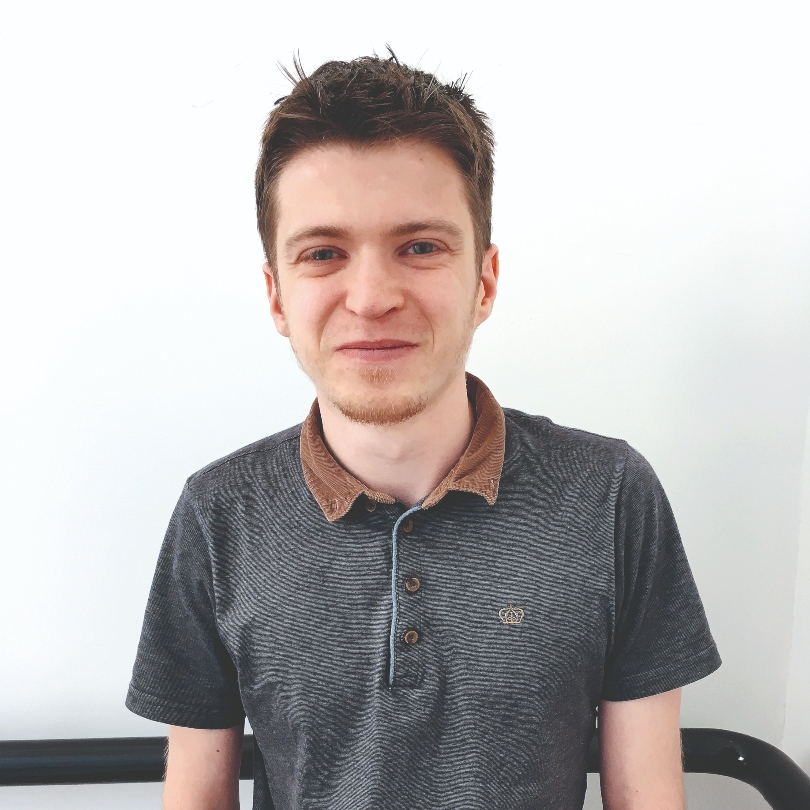
Chris joined FourFourTwo in 2015 and has reported from more than 20 countries, in places as varied as Ivory Coast and the Arctic Circle. He's interviewed Pele, Zlatan and Santa Claus (it's a long story), as well as covering the World Cup, AFCON and the Clasico. He previously spent 10 years as a newspaper journalist, and completed the 92 in 2017.
 Join The Club
Join The Club





